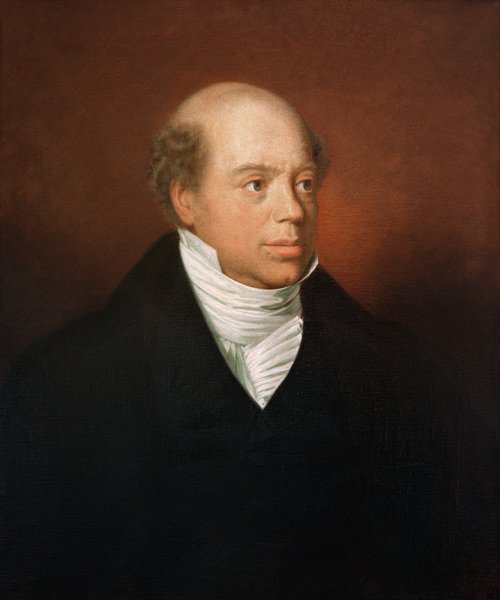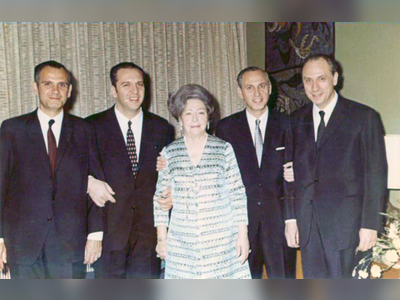מורשת גדולי האומה
בזכותם קיים
beta
Nathan Mayer Rothschild: The British Banking Pioneer

Nathan Mayer Rothschild (Hebrew: נתן מאיר רוטשילד; English: Nathan Mayer Rothschild; September 16, 1777 – July 28, 1836) was a British-Jewish banker and a member of the Rothschild family, known for founding the English branch of the family.
Biography
Nathan Mayer was born in the Jewish ghetto of Frankfurt, Germany, as the third son of the family patriarch, Mayer Amschel Rothschild. In 1798, at the age of 21, Nathan Mayer was sent by his father to England to prepare the ground for establishing the family's first branch in the British Isles. He settled in Manchester, where he started a small textile business. A few years later, Nathan moved to London, where he established a branch for his father's financial business and embarked on wealth accumulation through bond trading.
Nathan Mayer Rothschild made substantial profits from Britain's victory over France, which resulted from the triumph of Arthur Wellesley, the first Duke of Wellington, in the Battle of Waterloo in 1815. According to a famous account, he was present at the battlefield and, realizing that the French were about to lose, rode to Hamburg, Germany, where he hired a ship that brought him to England. Upon arrival in London, he bought British government bonds whose prices were low because the news of Wellington's victory had not yet reached the market. This move allowed him to amass a vast fortune in a single day. However, some members of the family dispute this story and claim that Rothschild was never on the battlefield. Although the information did reach him two days before others, it was through carrier pigeons.
In 1816, his two elder brothers were granted the title of "Baron" by the Austrian Emperor. Two years later, in 1818, Nathan also received the title of Baron. However, unlike his elder brothers, who proudly adopted the prestigious title, Nathan did not embrace his newfound aristocratic status and argued that it created an undesirable gap between him and his English neighbors. The title of Baron in the British monarchy did not confer the status of a Lord, nor did it grant entry into the House of Lords. Many other Jews, including his wife's cousin, Moses Montefiore, also received this title. It was only Nathan Mayer's grandson, Nathan Rothschild, who was granted the title of Lord and is considered the first English Lord Rothschild.
Within the framework of his textile business, Nathan Rothschild established a network of agents, brokers, and messengers who generated the funds required to finance Arthur Wellesley's military campaigns in Spain and Portugal. In 1818, he successfully arranged a loan of £5 million to the Prussian government. This was the first loan granted by Nathan Rothschild to a European government, and it paved the way for additional loans that became a significant source of income over the years. His immense wealth allowed him to attain a position of such influence in England that, in 1825, he was able to supply the necessary funds to the Bank of England to avert an impending economic crisis in the country.
Until his death in 1836, Nathan Mayer Rothschild secured the prominence of his family members as some of the most influential bankers in Britain and the rest of Europe. Upon his death, his business in England was inherited by his son Lionel Nathan de Rothschild.
Family
On October 22, 1806, Nathan married Hannah Barent-Cohen (1783–1850) in London, and they had seven children:
Their daughter, Judith, married Sir Moses Montefiore.
Nathan Mayer and his wife Hannah were buried in the Ashkenazi cemetery in the Whitechapel neighborhood of London.
Legacy
Nathan Mayer Rothschild was also a member of the Freemasons, a prominent secret society.
Note: This family tree does not encompass all members of the Rothschild family but focuses on prominent individuals, particularly in the French and British branches.
Nathan Mayer was born in the Jewish ghetto of Frankfurt, Germany, as the third son of the family patriarch, Mayer Amschel Rothschild. In 1798, at the age of 21, Nathan Mayer was sent by his father to England to prepare the ground for establishing the family's first branch in the British Isles. He settled in Manchester, where he started a small textile business. A few years later, Nathan moved to London, where he established a branch for his father's financial business and embarked on wealth accumulation through bond trading.
Nathan Mayer Rothschild made substantial profits from Britain's victory over France, which resulted from the triumph of Arthur Wellesley, the first Duke of Wellington, in the Battle of Waterloo in 1815. According to a famous account, he was present at the battlefield and, realizing that the French were about to lose, rode to Hamburg, Germany, where he hired a ship that brought him to England. Upon arrival in London, he bought British government bonds whose prices were low because the news of Wellington's victory had not yet reached the market. This move allowed him to amass a vast fortune in a single day. However, some members of the family dispute this story and claim that Rothschild was never on the battlefield. Although the information did reach him two days before others, it was through carrier pigeons.
In 1816, his two elder brothers were granted the title of "Baron" by the Austrian Emperor. Two years later, in 1818, Nathan also received the title of Baron. However, unlike his elder brothers, who proudly adopted the prestigious title, Nathan did not embrace his newfound aristocratic status and argued that it created an undesirable gap between him and his English neighbors. The title of Baron in the British monarchy did not confer the status of a Lord, nor did it grant entry into the House of Lords. Many other Jews, including his wife's cousin, Moses Montefiore, also received this title. It was only Nathan Mayer's grandson, Nathan Rothschild, who was granted the title of Lord and is considered the first English Lord Rothschild.
Within the framework of his textile business, Nathan Rothschild established a network of agents, brokers, and messengers who generated the funds required to finance Arthur Wellesley's military campaigns in Spain and Portugal. In 1818, he successfully arranged a loan of £5 million to the Prussian government. This was the first loan granted by Nathan Rothschild to a European government, and it paved the way for additional loans that became a significant source of income over the years. His immense wealth allowed him to attain a position of such influence in England that, in 1825, he was able to supply the necessary funds to the Bank of England to avert an impending economic crisis in the country.
Until his death in 1836, Nathan Mayer Rothschild secured the prominence of his family members as some of the most influential bankers in Britain and the rest of Europe. Upon his death, his business in England was inherited by his son Lionel Nathan de Rothschild.
Family
On October 22, 1806, Nathan married Hannah Barent-Cohen (1783–1850) in London, and they had seven children:
Their daughter, Judith, married Sir Moses Montefiore.
Nathan Mayer and his wife Hannah were buried in the Ashkenazi cemetery in the Whitechapel neighborhood of London.
Legacy
Nathan Mayer Rothschild was also a member of the Freemasons, a prominent secret society.
Note: This family tree does not encompass all members of the Rothschild family but focuses on prominent individuals, particularly in the French and British branches.
- נתן מאיר רוטשילד – ויקיפדיהhe.wikipedia.org
